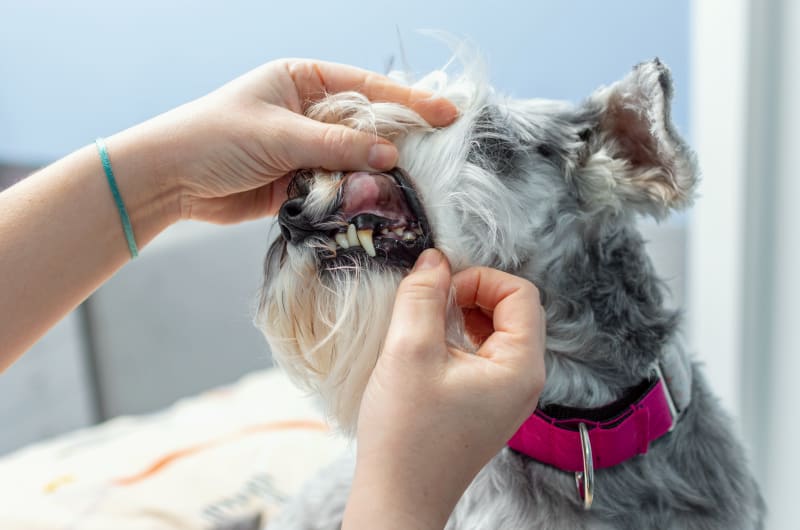Veterinary Dentistry in Huntersville
Our Huntersville vets provide veterinary dental and oral care for cats and dogs in Huntersville and throughout Mecklenburg County.

Dental Care for Cats & Dogs
Just like humans, cats and dogs need to have regular dental examinations and hygiene to keep their teeth strong and healthy.
Our veterinarians provide complete dental care, including professional cleanings, dental x-rays, dental surgery, and client education on at-home dental care.
Annual Cleanings & Exams
Your pet should have dental appointment at least once a year, and more often if they are prone to dental problems.
Your pet's annual dental cleaning and exam will include the following elements.
- Symptoms of Dental Health Problems
The following symptoms may be a sign of a dental problem in your pet:
- Bad breath
- Broken or loose teeth
- Retained baby teeth or extra teeth
- Tartar buildup
- Discolored teeth
- Abnormal chewing, drooling, or dropping food from the mouth
- Reduced appetite or refusal to eat
- Pain or swelling in or around the mouth
- Bleeding from the mouth
- Assessment & Examination
First, a thorough preanesthetic physical exam will be performed on your pet.
We will evaluate your pet's blood and urine to ensure your pet can safely undergo anesthesia. Additional diagnostics such as an ECG or chest radiographs will also be conducted, if needed.
Once your pet is under anesthesia, we will perform a full oral examination (tooth by tooth) and charting.
- Dental Hygiene & Treatment
Next, we will clean and polish the crowns of the teeth and under the gum line.
Each tooth is probed and radiographed. A fluoride treatment is then applied to each tooth.
Finally, a dental sealant is applied to retard the attachment of plaque. If advanced periodontal disease is found, a treatment plan will be developed and discussed with you at the end of the day.
- At-Home Prevention & Regular Checkups
A follow-up examination will be scheduled two weeks after the assessment and treatment appointment.
At this visit, we will discuss implementing teeth brushing at home as well as other products available that can help improve your pet's oral health.
Pet Dental Care FAQ
Have questions about your pet's dental care? Read the Frequently Asked Questions we've received from other customers.
-
Why is pet dental health important?
Dental health is an essential part of your pet's overall health. Just like humans, pets can experience a variety of dental problems, and preventive measures as well as treatment of any conditions or diseases such as periodontal disease or broken teeth should be treated immediately.
At least once a year, your pet's teeth and gums should be checked by a veterinarian to keep their mouth healthy and to check for any early signs of problems.
-
What are some common cat & dog dental problems?
Dental disease is the most common disease we see in cats and dogs.
Both cats and dogs can develop diseases of the teeth and gums including gingivitis and periodontal disease, which are caused by food and bacteria building up and hardening on the teeth.
It can lead to gum irritation, gingival recession and bone loss to the point that teeth may need to be extracted.
Gingivitis is also known as early stage gum disease, which progresses to periodontitis if not treated.
Tooth resorption, where tooth structure breaks down and can lead to pain and refusal to eat, is common in cats. It is serious and requires diligent care by a veterinarian.
-
What types of problems can your veterinary dentist help with?
Veterinary dentistry includes the cleaning, adjustment, filing, extraction and repair of your pet's teeth, plus other elements of oral healthcare.
Your veterinary dentist can treat a wide range of dental problems in cats and dogs, including but not limited to:
- Periodontal disease
- Tumors or cysts in the mouth
- Infected teeth
- Broken teeth or roots
- Misalignment between teeth and bite
- Broken jaw
-
Will my pet be in pain after dental surgery?
Depending on the procedure, your pet could feel some pain for a few days after a surgery such as a tooth extraction. We can often prescribe pain medication to alleviate most of their discomfort following the procedure.
If pain persists or intensifies, or you see other symptoms such as increased drooling, excessive swelling, heavy bleeding, or a sudden change in behavioral or eating habits, please contact us as soon as possible.
-
What can I do to protect my cat or dog's oral health?
An at-home oral care routine is essential to maintaining their oral health.
Their gums, teeth and tongue need to be kept clean to prevent bad breath, gum disease, tumors and other conditions.
Regular brushing with a toothbrush and toothpaste made specifically for your type of pet is a must, as are food and toys that will promote oral health and not damage their teeth.
Your veterinary dentist is an important partner in their oral care, so make sure to book at least an annual appointment (if your pet has specific oral health issues, they may need to see their veterinary dentist more often).
Dental Care & Anesthesia
When you visit the dentist, you understand that the process is designed to keep your mouth healthy. Your dentist can explain procedures to you, and so you accept them and let the dentist get on with it.
Cats and dogs do not understand any of this – and so they react by trying to escape or even biting. We perform all dental procedures under anesthesia because it allows us to care for your pet's teeth safely, and with less stress for the animal.
